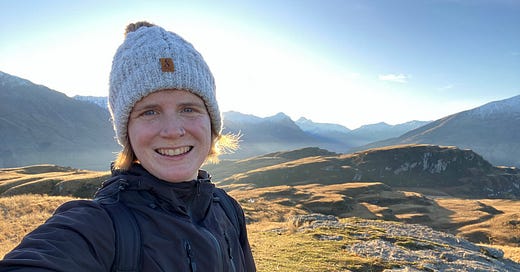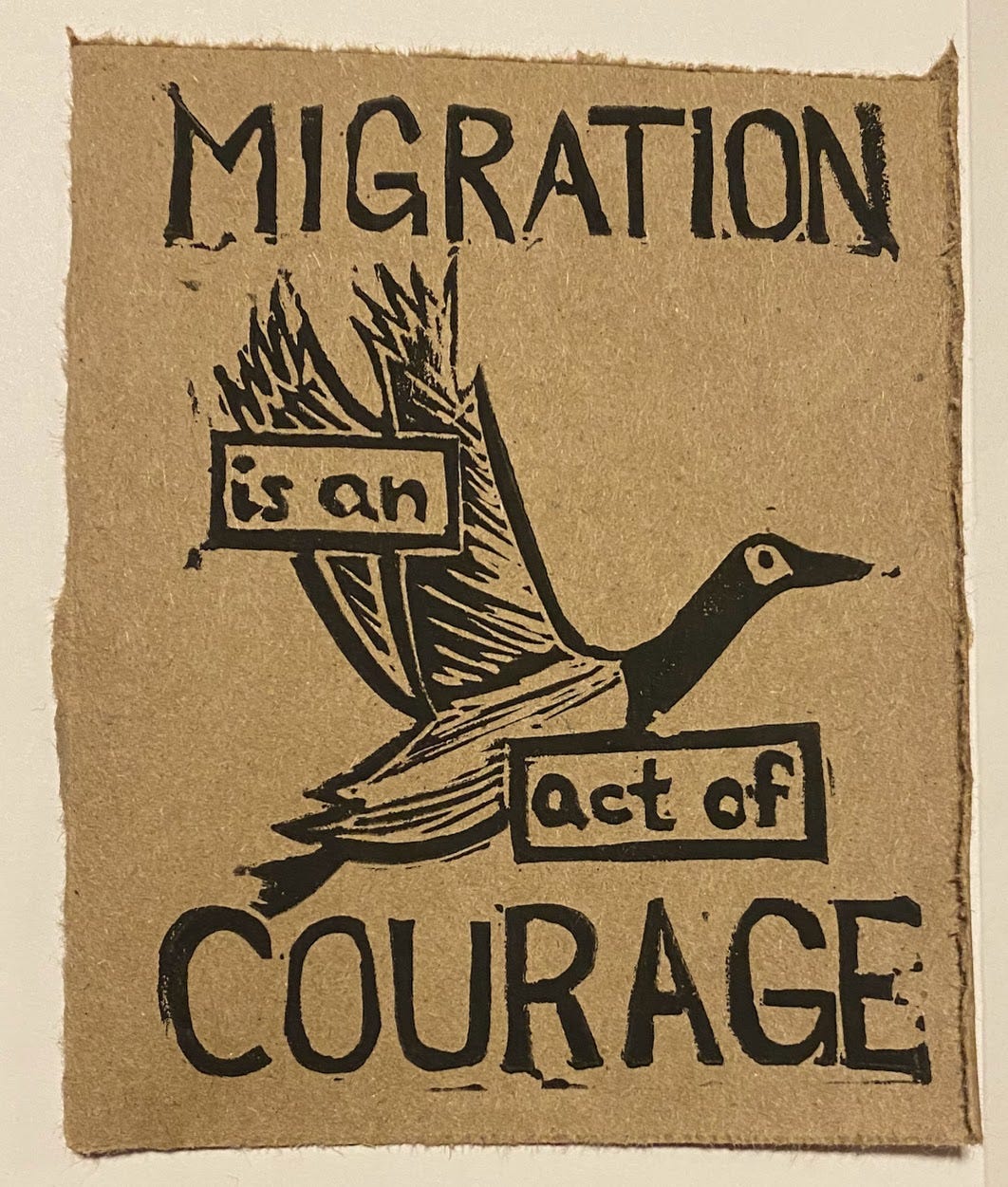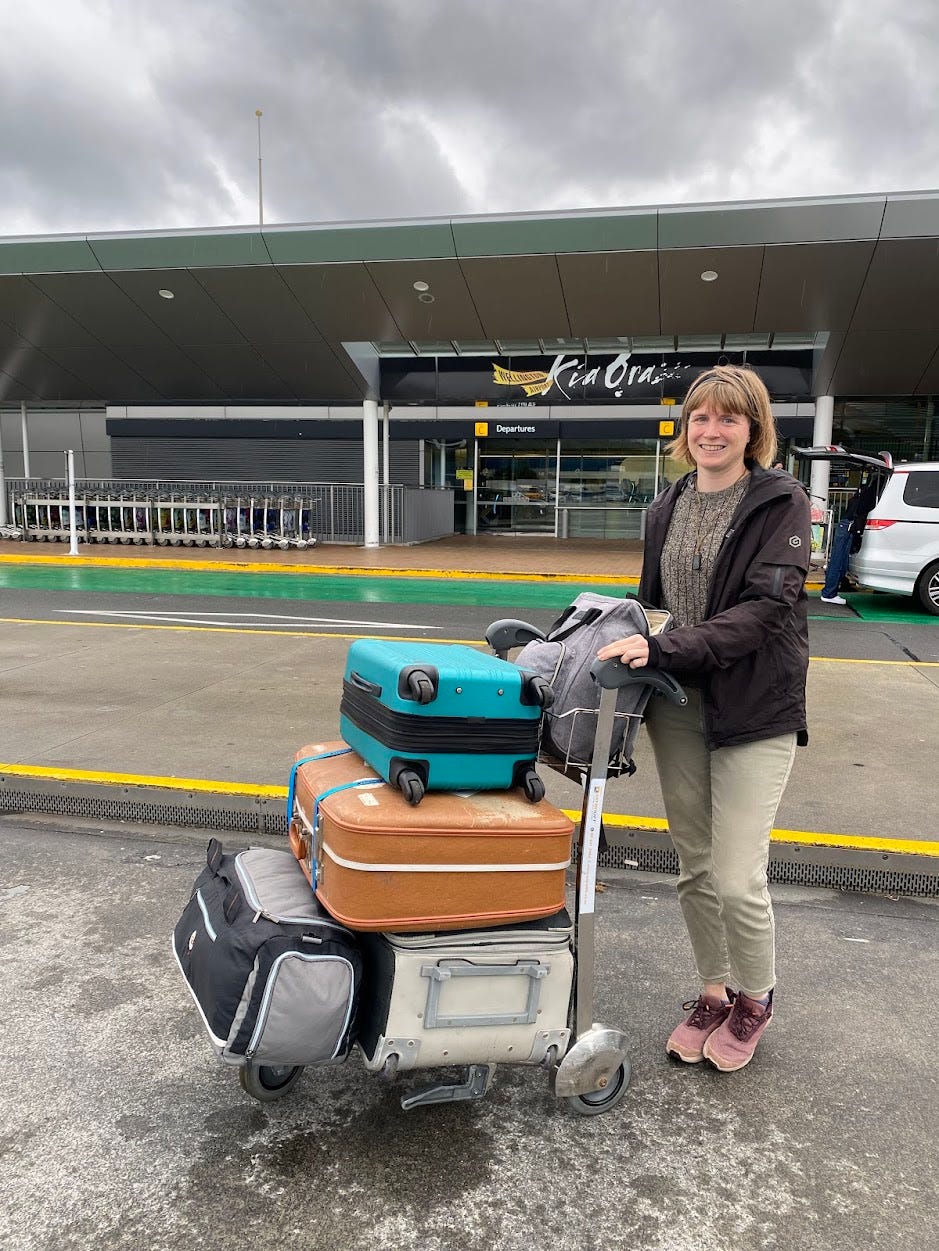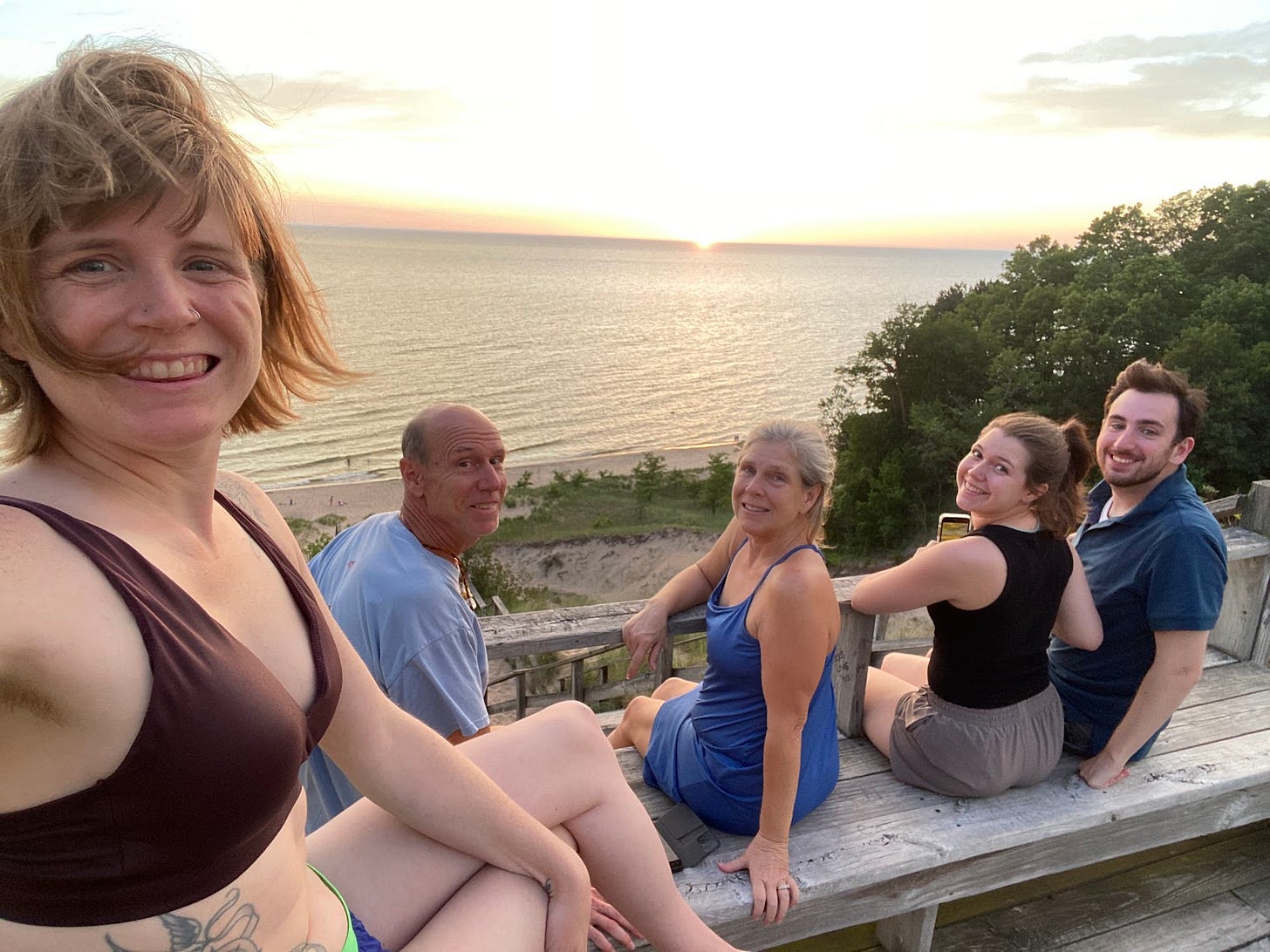Hello, bonjour, marhaba, kia ora, boozhoo! If you’re new here, I encourage you to check out my “About” page to learn more about this blog.
Maybe it was before a US presidential election or maybe it was after Roe v Wade was overturned in 2022… a lot of us have searched “how to move to Canada from the US” or something of that nature. How to get out. There’s even a subreddit, r/IWantOut waiting for you to make a post listing your skillset, circumstances, relevant heritage and dreams, and in return get advice on expatriating. (Whilst researching, I also came across r/AmerExit)
As we approach the announcement of our next president, I think this is a good time to explore the impulse to flee. I’m going to use my own experience as an example.
First, let me be clear: I think that migration is natural and borders are an unjust Western invention. Still, I don’t think we should all just get up and move when the conditions of our geographical region do not work in our favor.
Here’s a semi-relevant linocut that I made - proof that I’m not anti-immigration!
Unfortunately, these abstractly drawn borders do exist and are navigated differently depending on privilege, whether that’s nationality, income level, or political/administrative connections. For those of us that want to dismantle unjust systems, we need to think critically about whether we leave or stay. With that in mind, I hope we can also have empathy for those who decide emigration is the right choice.
As of 2023, I had lived in the US, Jordan, the UK, Iraq and Ukraine, among a few other places. I’d committed most of my life to understanding and addressing social justice issues at home and abroad, and it was wearing on me. I witnessed apartheid and heard stories about the Nakba in Palestine. I met Syrian refugees in Jordan. I listened to It Could Happen Here (first nine podcasts specifically) and watched The Handmaid’s Tale.. #WorldWarThree began trending in January 2020 after Trump assassinated Qassem Soleimani. While living in Detroit, I was illegally kicked off of Medicaid during the covid emergency. In Ukraine, colleagues told me how they never imagined their country would be attacked. My team underwent nuclear fallout training as we waited to see if Russia would bomb the Zaporizhzhia Nuclear Power Plant. I began to realize that full-time employment is not healthy for me at this point in my life, which could make healthcare unaffordable in the US.
Maybe you can see why I was steadily growing more nervous about my future as an American?
I believe change is possible and I know that it takes time, but I was growing impatient. Sure, I wanted to be part of building that utopia that I still believe is possible. But more to the point, I wanted to have a safe place to live and call home, from where I could continue to do the work of extending safety to everyone.
So, after I finished my work in Ukraine, I moved to Aotearoa New Zealand in April 2023. Here are my takeaways from this experience:
There are no utopias
In the Māori language, Aotearoa means “land of the long white cloud”. This refers to the cloud formations that helped the early Polynesian explorers navigate to the country. Unlike those who first saw the land of the long white cloud between 1200 and 1300 AD, I was not arriving on an unsettled land, untouched by empire and capital.
Since the arrival of whalers, traders, and European settlers, economic and legal structures have been developed which systematically discriminate against the original caretakers of the land – the indigenous Māori people. New Zealand is incredibly progressive in many ways, but it still has to reckon with its colonial past. As a non-Māori person, I had to be mindful of my role in this process.
With a genuine interest in indigenous rights and justice, I tried to be the most respectful and responsible settler I could be. Within a year, I had learned to recite my mihi mihi, I took a course on understanding and applying Te Tiriti - the document signed between the Māori people and the British government, and I attended Māori-led demonstrations.
While I was there legitimately according to the settler government, it’s hard to say whether my presence was beneficial or even desired by the indigenous treaty partners, who have very little say on immigration policies.
Regardless of what country you move to, your presence won't be without effect.
Expat influxes contribute to inequalities such as gentrification, notably in Latin America, Spain and Portugal. When Russian men fleeing conscription moved in droves to Georgia and Armenia , gentrification accelerated and tensions rose. In Georgia, some locals likened this to an occupation reminiscent of Russia’s 2008 invasion. It’s easy to imagine similar apprehension from residents of countries that US policies have negatively affected.
You will be leaving many people behind
Leaving is not a protest. Sometimes quitting is necessary for self-preservation, but let's not get it confused with creating any kind of positive difference on the place you’re leaving.
Departing creates a void that will eagerly be filled by those who aim to advance fascism and oppression. With fewer people engaging locally, certain voices will grow louder. Even if you plan to stay engaged and vote from abroad, you will never be as involved as you can be while living there. In my years of being abroad, I’ve followed US news closely, voted, signed petitions, and shared on social media, but I’ve found that the lack of proximity keeps me from doing much more than that.
Leaving might improve life for you, but what about those who don’t have the option to go? Many countries have immigration requirements regarding income and education levels - excluding those with less access to these resources.. Many countries have health requirements for gaining residence - excluding people with disabilities or chronic conditions.
Have you considered people who came to the US as refugees from places US foreign policy has rendered unsafe? If you’re exploring your heritage through emigration, do you also consider those whose heritage was stripped away by the slave trade? Do you consider those whose heritage is tied to land that was stolen through coercion and broken treaties? Without the support of those who walked away, these people will be left to confront the fascist agenda alone.
While I struggled with my decision to stay or to leave, a friend of mine patiently reminded me how much privilege I benefit from in the US. While I will struggle, being an educated, able-bodied, cis, white person with a large social network means that I will almost always have access to a myriad of resources. How much would the policies I fear actually impact me, compared to those who can't leave?
You will STRUGGLE with bureaucracy
I arrived in New Zealand on a temporary 1-year work visa, and planned to use this as a trial period and stepping stone to gaining residence. When I first arrived, I had enough “points” to apply for residency, but I didn’t see any hurry. A few months later, this opportunity had closed and a new system came into effect. I now needed further in-country work experience which required a regular work visa, which required a job offer from an “Accredited Employer”. With a newly elected, more conservative government, funding for government and other public service-type jobs such as public health (my field of work) was undergoing heavy cuts. It was highly unlikely that I would be chosen for a job over the thousands of citizens and residents who had recently faced layoffs. I explored other options such as doing a PhD there or changing professions to one that was more in-demand, but ultimately I decided against these. I was devastated to have my opportunity taken away.
Please, do not underestimate the stress of the immigration process. The uncertainty can stretch on for months, sometimes years, while you work to build a life and connections in a place that might not allow you to stay. If you’ve ever dealt with job or housing insecurity, you’ll recognize this feeling—in this case it encompasses nearly everything in your life. The possibility of being asked to leave will weigh heavily on your well-being as you wait for the process to be carried out.
New Zealand is considered one of the more accessible countries for Americans with no heritage-based citizenship options, but that doesn't make the process easy. Some highly skilled roles can improve your chances and ease the paperwork, but for most countries, the path is much harder than what I described.
Flying out of New Zealand with my embarassingly huge amount of luggage - I’d accumulated things because I thought I’d be staying longer!
Immigration is lonely
If you studied abroad in college you might have great memories of making friends and exploring the country together. Now in my early 30s, I found that most folks my age had already solidified their friend groups, paired off, sunk into routines or even started families. If you move with a partner, this may be easier, but it could also have the opposite effect - putting a strain on the relationship.
Even as someone who spent most of the last ten years living abroad, I often face insecurities about my cross-cultural friendships. Americans are known for being overly-enthusiastic and outgoing. As much as I try to distance myself from American stereotypes, I realize now how I’ve internalized that behavior as a baseline. The New Zealanders I met were, in general, more reserved when it came to making friends and deepening those friendships. Wherever you go, chances are your ideas about socialization and friendship will not align with local norms. Over time you can likely adapt, but be prepared to feel isolated until that happens.
While I met incredible people in New Zealand, I struggled to find my niche.I loved the nature, I loved the work-life balance, I loved the walkability of my city and I loved the gas-station pies… But in the end I felt like I loved a country that didn’t love me back.
Me, in love with New Zealand
Since coming back to the US, I’ve been reminded that this is indeed where I come from. I struggle to feel like I fit in anywhere, but it's undeniable that I was socialized and am adapted to American ways of communicating.
Finding community here in the US
I’m coming up on five months back in the US and for the first time since I can remember, I’m looking forward to building a life here. I haven’t even chosen the city that I’ll put down roots in, but I already feel so much more connected and useful. Through an in-person gathering, I met a group of activists that I’ve been organizing with nation-wide. I’ve met marginalized people in my community who I’ve been able to support through difficult times. While dating in New Zealand was a boon, I’ve already found a wonderful partner and I feel more secure in my relationships here than I did in New Zealand.
Building the future is a communal endeavor. For those who are on the fence about leaving, I wonder if finding people who are doing solidarity organizing in your local community would make you feel more secure? Look especially for those who can’t leave as they will be the ones committed to making our communities livable, as their only option. Maybe you will realize that what you need can be found around you if you do a bit of digging. Or maybe it will become more clear that you need to leave.








I completely agreed with your editorial about going to live in a different country and its isolation and challenges. Later I looked at it differently. I think where you went wrong was doing it alone. I grew up north of Boston. Over 100 years ago thousands of Italians and Irish moved there. North Boston is still know as the Italian section and "Southie" is Irish. Out here in the Bay Area, many Afghanis moved to Fremont. After the US pulled out a lot more came to Fremont. And that's the key to a successful move. You don't do it alone. You find an area within a country with a bunch of ex-pats and, as a community, they help you assimilate into "the new world". I really think it didn't work out for you because you did it alone.
Don M.
Bay Area CA
Great read. Thanks for giving us an insight into all these different aspects and considerations of migrating!